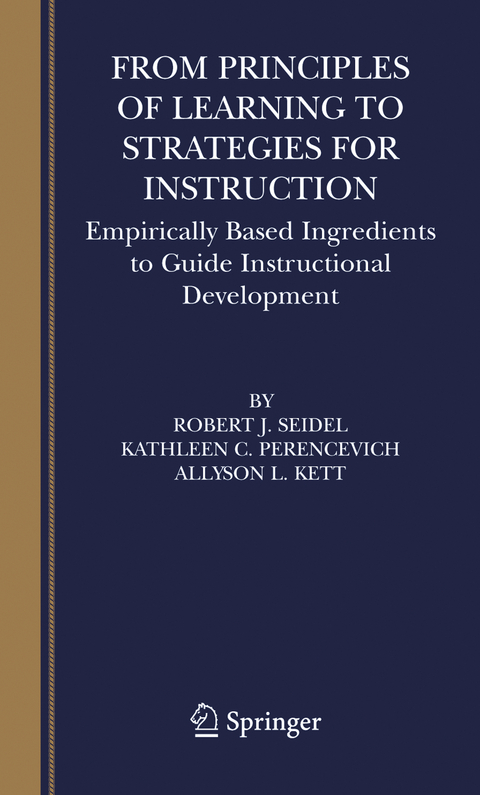
From Principles of Learning to Strategies for Instruction
Springer-Verlag New York Inc.
978-1-4419-3632-5 (ISBN)
The primary goal of instructional design is improving the quality of learning and instruction. Instructional designers have focused on a number of areas of critical concern and developed a variety of techniques to achieve this goal (Reigeluth, 1983, 1999). Critical areas of concern for those who plan, implement and manage instruction include (a) needs assessment (identifying gaps or deficiencies in knowledge and performance to be addressed in instruction); (b) task analysis (identifying the types of knowledge, skills and attitudes to be developed during instruction); (c) learner analysis (determining who the learners are, what they know, relevant differences, etc. ); (d) instructional strategies (developing strategies appropriate for the task and learners involved); and (e) assessment and evaluation (determining how to assess individual progress and evaluate programs). There are many books already in print that treat the general domain of instructional design, as well as texts that target each of these areas of concerns. Why then another book on these issues? There are several answers to this question. Many of the available books treat instruction as a formal process that proceeds according to specific and detailed instructional systems development models (see, for example, Dick, Carey & Carey, 2005). Indeed, the US military has created a series of handbooks specifying details of the various instructional development processes (see Department of Defense, 1999).
Currently, Dr. Robert J. Seidel is Research Chief Emeritus at the Army Research Institute. He attained his Ph.D. in Experimental Psychology from the University of Pennsylvania and was a NIH Special Postdoctoral Fellow at Stanford University. He has taught full- time at Denison University, and part-time at, George Washington University, the University of Maryland, and Trinity College in Connecticut. He has a varied and rich experience base spanning over 36 years of research, development, and management in the areas of experimental design, individualized instruction, computer-administered instruction, technology transfer, distance learning, and evaluation. In these areas of expertise, he has given many talks, nationally and internationally, published numerous articles and seven books. He was principal investigator for a National Science Foundation grant, which resulted in his co-authoring, (with colleagues B. Hunter, C. Kastner, and M. Rubin) Learning Alternatives in U.S. Education: Where student and computer meet. Dr. Seidel organized, then conducted an educational technology conference, and subsequently edited (with M. Rubin) a book, Computers and Communication, based on the findings from the conference. The next book, Computer Literacy, was edited by Dr. Seidel, R. Anderson, and B. Hunter. He has also managed groups of research personnel in both the private sector and in government, and has served many years as an advisor to NATO for the implementation of advanced technologies. As part of his NATO work, Dr. Seidel served as senior editor and contributed chapters to four books dealing with the use of technology in education and training. Kathy Cox-Perencevich is finishing up her dissertation towards obtaining her Ph.D. at the University of Maryland in educational psychology, while working full-time as a lead researcher at The National Reading Research Center. She attained a M.S. in educational psychology at the Pennsylvania State University and completedteacher certification programs in elementary education and in special education in Massachusetts. Ms. Cox-Perencevich has been pursuing research related to diagnosing and improving students engagement in literacy development. Her overall focus has been on cognition and motivation in classroom settings. In that regard, she has a number of recent publications in educational psychology journals, and book chapters, dealing with techniques for enhancing motivation and cognitive development in the field of Reading. Allyson Kett is presently completing her work towards a Psy.D. in Clinical Psychology from the American School of Professional Psychology at Argosy University, Washington D.C., and is a National Consortium Research Fellow at the U.S. Army Research Institute in Arlington, VA. Prior to coming to D.C., she obtained her M.A. in Clinical Psychology with a specialization in Education at Teachers College of Columbia University in New York City and her B.A. in psychology from the College of William and Mary in Williamsburg, Virginia. Ms. Kett has a broad, verse background in developing and delivering instruction in the training and educational fields. She worked at the New York Bankers Association developing educational programs for bankers of all levels. In addition, she has experience working in the educational field, including developing instructional materials for, and assisting in the teaching of, children of all ages who are mentally challenged and/or have developmental disabilities. Ms. Kett also assisted in planning, organizing, and implementing seminars and leadership forums for a national, industry sponsored, college Scholars Program.
Heuristics and Taxonomy.- A Cognitive Domain Example: Reading.- Psychomotor Domain.- Affective Domain.- Interpersonal Domain.- Suggestions for the Integration of Technology.- Summary.
| Zusatzinfo | XXVI, 230 p. |
|---|---|
| Verlagsort | New York, NY |
| Sprache | englisch |
| Maße | 165 x 248 mm |
| Themenwelt | Geisteswissenschaften ► Psychologie ► Allgemeine Psychologie |
| Geisteswissenschaften ► Psychologie ► Pädagogische Psychologie | |
| Medizin / Pharmazie ► Medizinische Fachgebiete ► Psychiatrie / Psychotherapie | |
| Sozialwissenschaften ► Pädagogik ► Schulpädagogik / Grundschule | |
| ISBN-10 | 1-4419-3632-7 / 1441936327 |
| ISBN-13 | 978-1-4419-3632-5 / 9781441936325 |
| Zustand | Neuware |
| Informationen gemäß Produktsicherheitsverordnung (GPSR) | |
| Haben Sie eine Frage zum Produkt? |
aus dem Bereich


